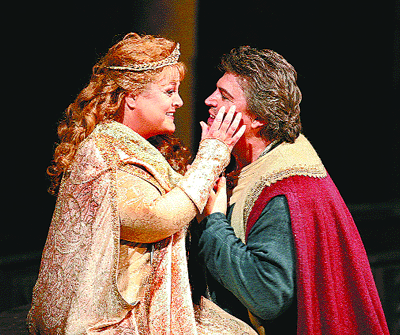Met audience embraces soprano in demanding role
The conventional wisdom is that weight loss is hazardous to a singer’s vocal health, but Deborah Voigt’s first local Elisabeth in “Tannhäuser” proves that’s not necessarily so.
The noticeably thinner soprano swept onto the stage of the Metropolitan Opera (November 18), capping her entrance aria “Dich teure Halle” with a blazing high B. She then settled in for an evening of some of the best and most consistent singing I’ve ever heard from her. Particularly impressive was Voigt’s impeccable intonation in the third act prayer, a piece of sustained soft music notoriously difficult to sing in tune. Radiant in court dress of white and pale gold, Voigt created a touchingly human-scaled young woman, uncertain and delicate, eager to please and easily hurt.
Although “Tannhäuser” is a fitting opera for Voigt, she sings it infrequently, most likely due to the shortage of tenors who can sustain the punishing title role. On November 18 she sang opposite Peter Seiffert, who made his long-overdue Met debut with a performance that was not only reliable but sensitively musical as well. The voice is not huge, but it has the Heldentenor qualities of energy to punch through a heavy orchestration, plus the stamina to conquer the marathon “Rome Narrative” in the third act. A tall, solidly built man, Seiffert moves with authority and commands the audience’s attention while standing perfectly still.
Baritones performing the sidekick role of Wolfram have the consolation of getting to sing the gorgeous “Abendstern” aria, and Thomas Hampson made the most of that opportunity, spinning out the lyrical lines with the most melting legato. I only wish he would spare a bit of that vocal suavity for the rest of the role, which was often punched out in a hectoring manner.
As Venus, Michelle DeYoung looked like a young Raquel Welch and, boy, did she nail those high notes. Bass Kwangchul Youn sounded more comfortable as the Landgraf than he did last month as Sarastro, but it’s still an underwhelming sound in such august company.
The Met orchestra can sometimes indulge in bad behavior (lazy attacks and blatty horn-playing) when a guest conductor is on the podium, but Mark Elder kept them in line. He favors rather broad tempi but keeps the texture of the sound lean and focused so the singers need not bellow. I hope we’ll hear more of Mr. Elder soon, since his musical performance could hardly have been better.
If only I could say that about the dramatic side! In this listless rehash of Otto Schenk’s staging, the “Bacchanale” succeeds in making group sex look boring, and Tannhäuser’s obscene song in Act II barely rouses the chorus to remember their blocking.
Maybe the Met should hire Ira Siff to revive a production or two. With only a few hand props and a narrow strip of the Carnegie Hall stage to work with, the impresario/stage director summoned heartfelt and dramatically convincing performances from the large cast of Opera Orchestra of New York’s “La fanciulla del West,” heard November 22.
A prime example of Siff’s magical stagecraft was the performance of soprano Aprile Millo, whose onstage persona has been known to veer past mannerism into camp. She portrayed Puccini’s gun-slinging Minnie with a sincerity and warmth I had despaired of ever seeing again on the operatic stage.
Of course all the sincerity in the world is no help if a Minnie can’t sing this terrifying score. Millo not only can, but does. Her voice is in excellent condition, glamorous and mellow in middle range, brilliantly penetrating on top. The high notes peppering this score didn’t faze Millo; in fact, at the climax of Act II, she flung out a long-sustained high C-sharp most other sopranos either just touch or else omit entirely. But Millo’s finest effects are less obvious: she polishes little four or five-note phrases here and there with a silken portamento that makes them shine like jewels.
As with all too many of these OONY performances, the fall-off from star lead to the rest of the cast was precipitous. Tenor Carl Tanner offered muscular top notes in the Caruso role of Dick Johnson, but sounded wooly and muffled in low-lying phrases. As Rance, Marco Chingari offered generic Italian baritone sound and no particular sense of menace.
It’s not so easy to comment on the rest of the large cast, because for most of the evening they were swamped by the out-of-control roar of Eve Queler’s orchestra. The first ten minutes of the opera, up until Minnie’s entrance, might as well have been done in pantomime for all the singing we heard.
Queler managed to rein in somewhat for Millo’s scenes, but still the playing could best be described as crude. Puccini’s scoring of “Fanciulla” boasts exotic subtleties of color rivaling those of “Turandot,” but you sure as hell wouldn’t have known that from this performance.
James Jorden is the editor of parterre box, the queer opera zine (parterre.com).



































